In this series, we get to know the Artists behind the work with ten questions about their practice, their space, and their ideas. These are their Stories.
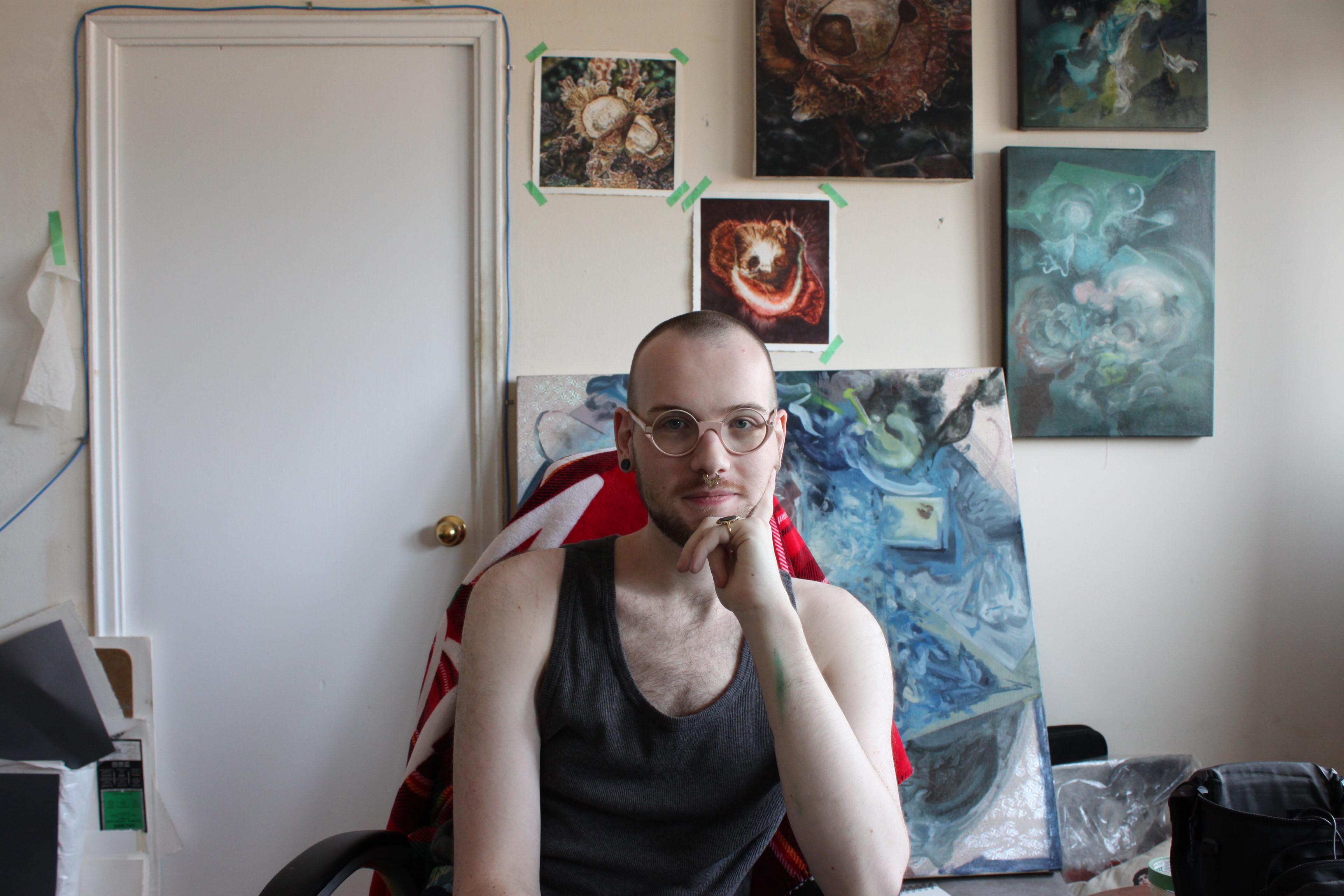
Jordan Clayton is an award-winning artist who specializes in painting and drawing. His work has been exhibited internationally from the very start of his practice and now belongs in several private collections.
Describe why you chose your particular medium?
I’m not sure I have the attention span to stick to one particular medium to make work, to be honest. I also tend to lean into the philosophy that one should choose the best tools to do the job they want to do; I’ll jump around between various media depending on how and what I want to make.
Sometimes an idea works better as a painting, versus a drawing, or a print. I’m primarily focused on image and two-dimensional media at the moment, but I’m interested in pursuing sculpture at some point.
What was the first art piece you created?
I genuinely don’t remember, but I could very confidently guess it had something to do with video games. The sega genesis was very formative for 4-year-old Jordan; my main access to visual culture at that time was through 16-bit computer graphics. I glean a lot of inspiration from video games made between the 80’s and 90’s, particularly those which began to use, and arguably struggled with, narrative.

Why do you create art?
I don’t know if I have a really good answer for that. I feel compelled to make things, especially by hand. I tend to feel gratified when I’ve produced something and I haven’t found the same sense of satisfaction doing anything else. I also have an irrational distaste for anything practical or functional, so it seems to make sense for me to be doing something that stimulates abstract thought.
What is your process when starting a new piece?
I’m constantly writing ideas and titles down in various sketchbooks or my document cloud as they hit me; I also have a habit of collecting reference imagery and various books that pique my interest (which are then lazily and haphazardly stored either digitally or in meat-space). When the time comes for me to start a new piece, I’ll revisit what I can find to refresh the thoughts that I have stirring and move into drawing. I’ll make several small drawings and often re-draw over compositions until I reach something that works really well-and then come back to it and re-draw better ideas on top of it because it’s usually not as good as I think. Then I move on to fiddling with colour and if I’m working with paint, I’ll mix out my initial palette.
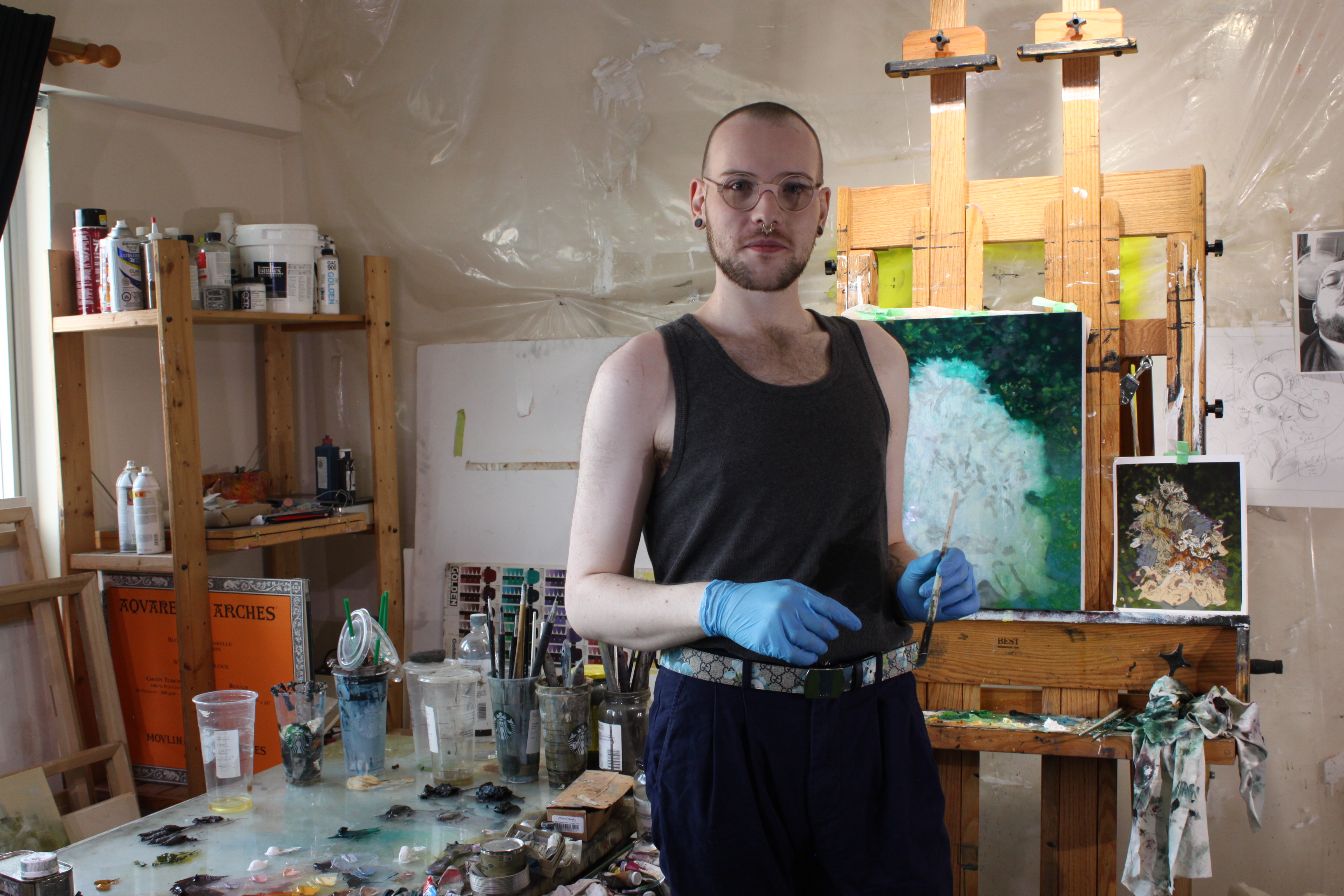
Once I’ve settled on a strong-enough plan, I move into preparing the substrate that I want to use; I’ll come back to certain size formats and ratios often because of compositional habits, but I tend to let the work dictate its presentation. From that point I begin to make the piece, which for me becomes a battle of wits. I’m very good at working myself into a corner and a large part of my practice involves me wrangling with the work until its right again. I like to think that my images mutate from an initial gene; I very rarely find that my work moves unchanged from draught to resolution. I think that’s common to a lot of makers; you stumble upon changes and make decisions in response that make the final product a lot more interesting.
What inspires you to create your work? What do you want your art to express?
I source a lot of my ideas from looking at images from nature, which is actually a little ironic given that I don’t like to spend time in it (I’m very delicate). I also have an obsession with science fiction which tends to creep into my brain-space. I’m drawn to melancholic narratives, stories that deal with cosmic horror and existentialism. I think a lot of my interests come from feeling displaced from the rest of the world, a sensation I know to be shared by the queer and marginalized. Identity politics aren’t the primary focus of my work, but I dabble with a bit of queer theory and camp when I’m conceptualizing imagery. I’d liken what I do to imagining a parallel universe constructed in reaction to my experiences; the logic is based on observed reality, but it frames normalcy a few steps further into the fantastical and grotesque.
I also obsess over still-life paintings of flowers; a lot of my compositional tropes borrow heavily from Dutch tradition. I don’t have a good answer as to why that is; I should think more about it.
Have you ever experienced a time when it was hard to create?
I would be skeptical of anyone who answers no to this question. Art making is generally a very human activity and thus, is subject to the ebbs, flows, emotions, and eccentricities of the maker. I’ve gone through some really wicked creative fatigue, burnout, identity crises, you name it. You can also tell when I’ve forced myself to make work to try and get through it by making; I’ve birthed several crappy paintings and drawings to meet tight deadlines and get out of a funk. While I’ve appreciated what those pieces taught me, I think the greater lesson learned in retrospect is to take more time when needed.
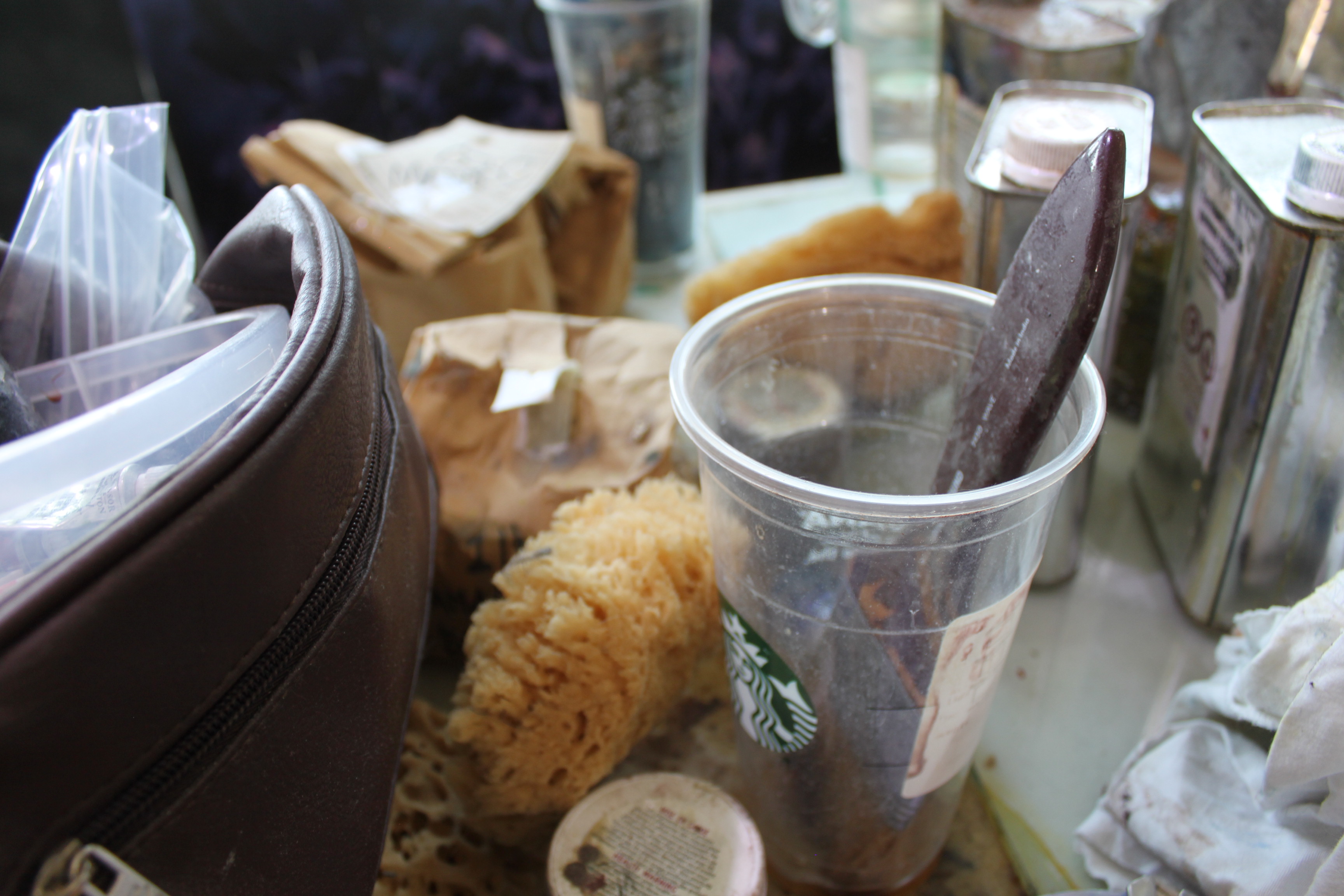
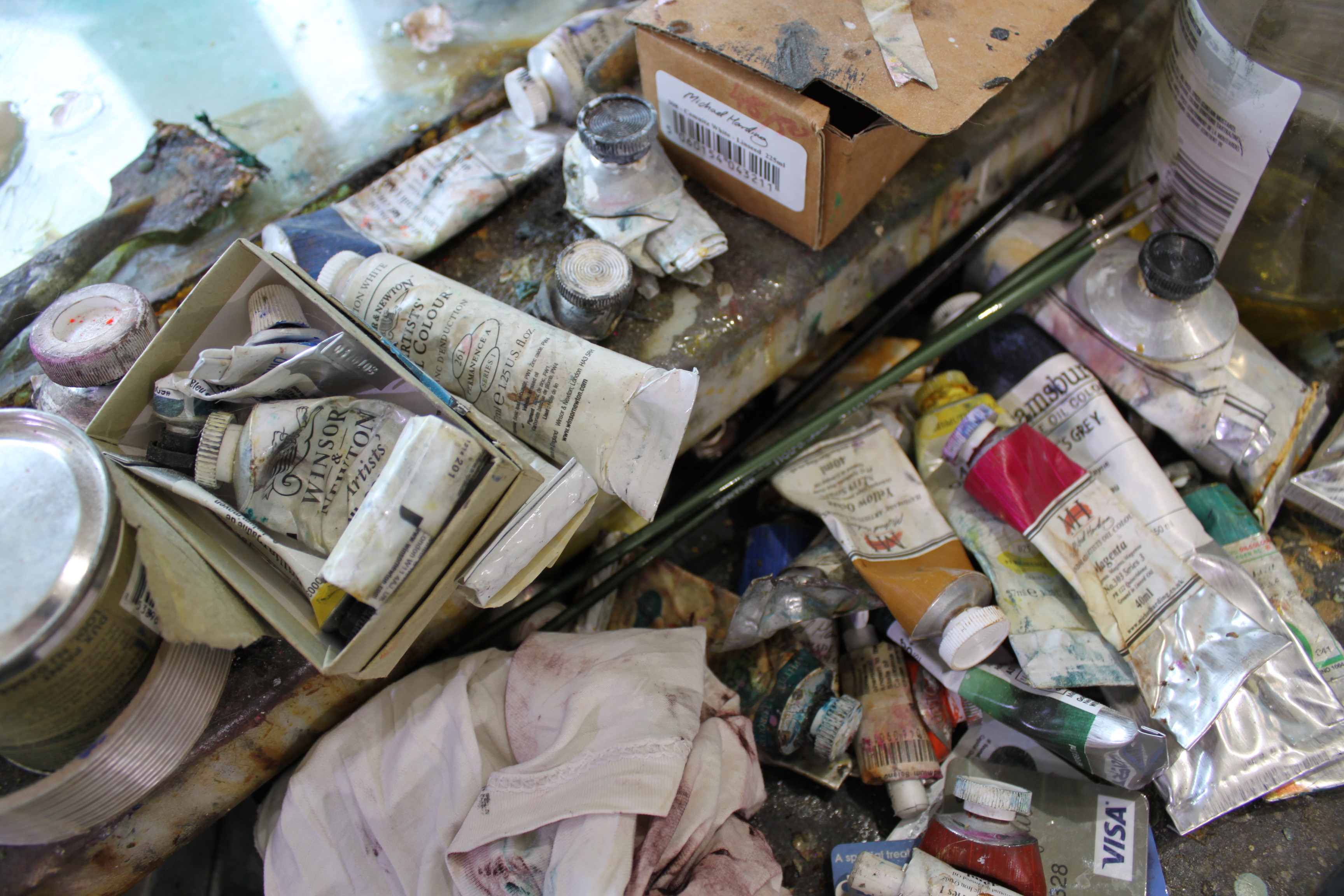
Have you ever been unhappy with an art piece you created?
Absolutely! I’ve destroyed a few pieces and re-painted over past paintings. I know a lot of artists will do that; you have to make really bad art to be able to make good art. A lot of my growth can be attributed to learning through making, both during and following creation. I often revisit past work and critique where its weak to evolve my technique and strengthen my decision-making skills. I also have a tendency to make rash decisions with an unwarranted sense of confidence while in the fervour of making. I’d like to think that my work tends to become more compelling when my convictions connect with my recklessness; it’s often a fool’s gamble, but there’s a bigger payoff when it clicks. I figure it’s better to take a big hard swing even if I end up missing.
If art was never part of your life, where would you be?
I haven’t really given this a lot of thought because it usually makes me feel lost and unhappy. My best guess would be that I would be in some equally impractical career that involves a lot of thinking. I don’t really have any employable skills and I seem to get very bored when trying to develop them; I’m going to pretend that’s a sign from the universe telling me to keep making things.
How do you spend your time when you’re not creating artwork?
That depends: I’ve hopped from various day jobs to keep the lights on, which makes time a very precious and limited resource in fostering an artistic practice. I do take periods to practice full-time, which thankfully affords me a bit more freedom, (and less guilt), in pursuing other activities to relax and enrich my artistic vocabulary. I’m a bit of a nerd and a hermit, so I tend to engage in solitary activities. I enjoy reading, learning, visiting exhibitions, and playing (usually older) video games. I’ve also been meaning to give a lot more time to watching film; I didn’t really consume a lot of cinema growing up, which left me with huge gaps in cultural knowledge that I’d eventually like to fill.
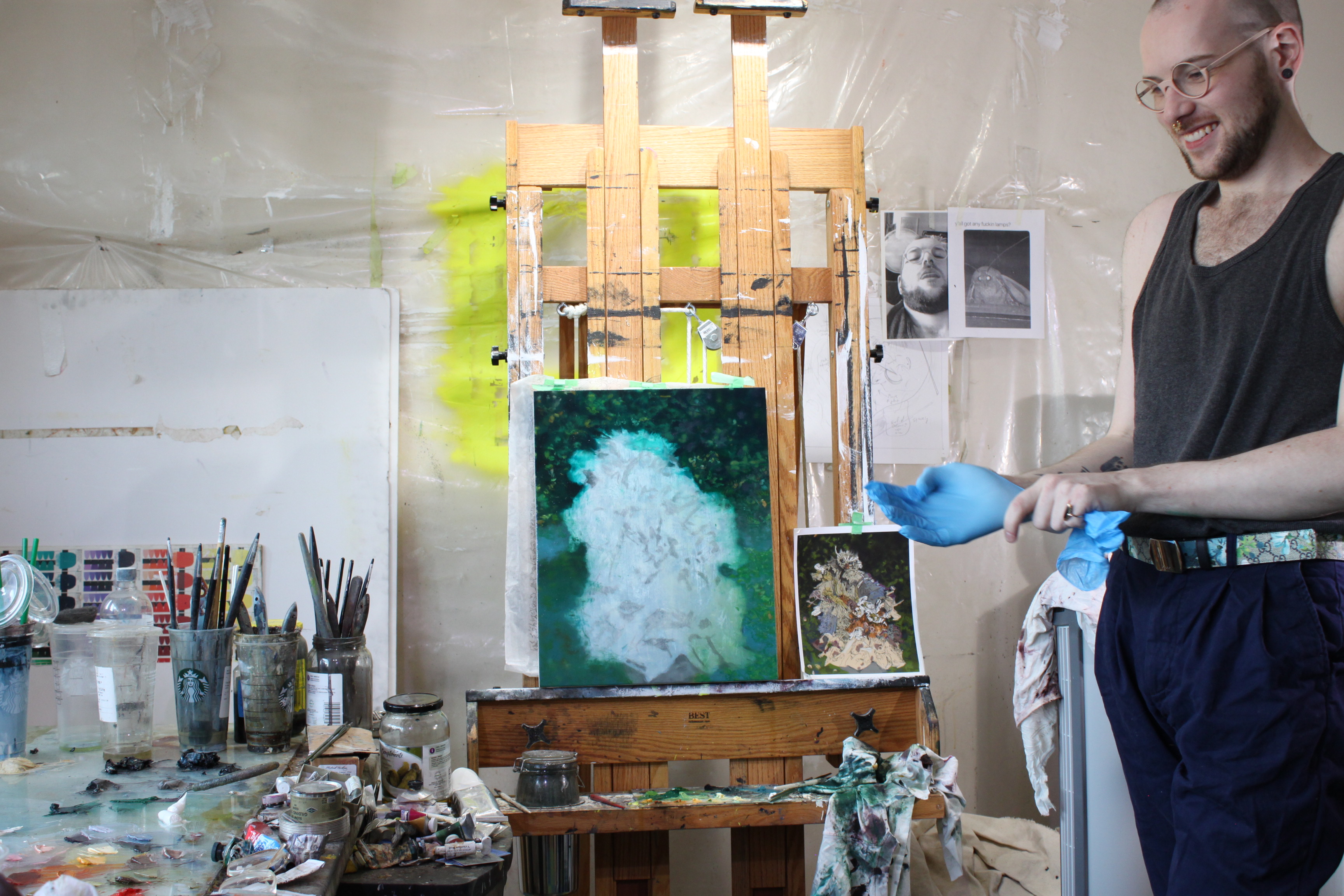
When you are working, is there anything you listen to?
It changes based on my mood and what sort of painting I’m doing. I often listen to podcasts discussing politics (I promise I don’t hate fun), but I’ll also listen to music. I listen to a lot of Björk, and grandiose soundtrack scores (for films I’ve never seen). I’ve also gone through periods of obsession over decades of music, all of which have preceded 1990. I’m currently revisiting Disco, Motown, and various eras of Jazz, gravitating toward female artists. That’s actually a common theme amongst my listening preferences; I don’t seem to connect with men in music unless they’re queer or were a “confirmed bachelor.”
I don’t always listen to music; I tend to get caught up working in a silence disturbed only by the fans of my ventilation. It happens more when I’m writing, but I’m easily distracted by sound and it can interrupt the flow of my thoughts. The more focused I am while making and thinking, the quieter I need my space.
Shop Now Jordan Clayton’s Work
Do you want to be featured? Join Partial as an artist and e-mail us at hello@partial.gallery. We’d love to share your work.